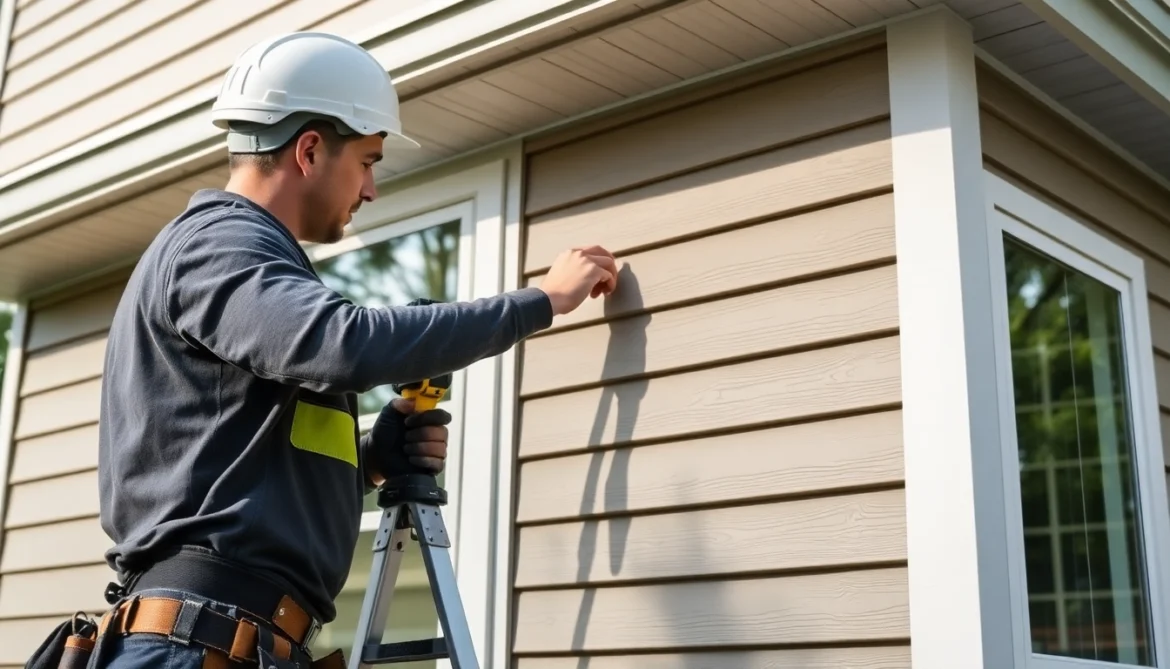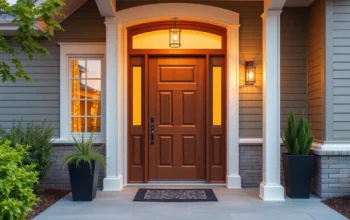Understanding the Role of a Siding Contractor
What Does a Siding Contractor Do?
A siding contractor specializes in the installation, repair, and replacement of exterior siding materials that protect and enhance the aesthetic appeal of residential and commercial buildings. Their responsibilities extend from initial assessment and material selection to ensuring precise installation and adherence to safety standards.
These professionals perform comprehensive site evaluations to determine the optimal siding solution based on climate, the structure’s architecture, and client preferences. They measure, plan, and order materials, ensuring compatibility with existing structures and compliance with building codes. During installation, they manage the removal of old siding, prepare the underlying surfaces, and expertly install new siding, paying close attention to waterproofing, insulation, and finishing details.
Additionally, siding contractors often provide repair services, addressing issues like cracks, warping, and moisture infiltration, which can compromise the integrity of the building. Their expertise ensures durable, weather-resistant exteriors that require minimal maintenance over time. In essence, they are the key experts transforming a building’s outer shell into a durable, energy-efficient, and visually appealing facade.
Types of Siding Materials Offered
Modern siding options are diverse, each offering unique benefits tailored to various needs, budgets, and aesthetic goals. Here are the most common types provided by professional siding contractors:
- Vinyl Siding: One of the most popular choices due to its affordability, durability, and low maintenance. Vinyl siding is resistant to chipping, fading, and pests. It comes in a variety of colors and styles, mimicking the look of wood or other materials.
- Hardie Board (Fiber Cement): Known for its strength and longevity, James Hardie fiber cement siding withstands harsh weather, resist fire, and requires minimal upkeep. It’s an excellent option for durability and a wide array of design possibilities.
- Cedar and Wood Siding: Valued for its natural beauty and traditional appeal, wood siding requires regular maintenance but provides excellent insulation. It’s often chosen for historic restorations and homes emphasizing a rustic or classic look.
- Aluminum and Metal Siding: Offers exceptional durability and is fire-resistant. Metal sidings are often used in commercial buildings but also in residential applications for a modern aesthetic.
- Cedar Shake and Shingle: Crafted from natural cedar, these sidings add texture and character to homes, offering a timeless appeal but requiring regular maintenance to prevent rot and insect damage.
The choice of material influences the overall performance, appearance, and cost of your siding project. Professional siding contractors evaluate your needs and local conditions to recommend and install the most suitable options.
How to Choose the Right Siding Contractor for Your Project
Selecting a qualified siding contractor is crucial for ensuring quality work, durability, and value for your investment. Consider the following factors:
- Experience and Reputation: Look for contractors with extensive industry experience and positive customer reviews. Established companies like Morgan’s Construction LLC can demonstrate a track record of successful projects.
- Licensing and Insurance: Verify that the contractor holds valid licenses and comprehensive insurance to protect you from liabilities.
- Materials and Warranties: Ask about the brands, materials, and warranties offered. A reputable contractor partners with trusted manufacturers and offers comprehensive warranties.
- Portfolio and References: Review previous work and contact references to gauge the contractor’s craftsmanship and professionalism.
- Pricing and Transparency: Obtain detailed quotes and ensure the scope of work is clearly outlined to avoid hidden costs.
Step-by-Step Guide to Siding Installation and Replacement
Initial Consultation and Assessment
The process begins with a comprehensive on-site evaluation by your chosen siding contractor. They assess the current siding condition, check for underlying issues such as rot or water damage, and evaluate your aesthetic preferences, budget, and project timeline. This stage often includes measuring the building’s exterior, inspecting structural components, and discussing material options. An experienced contractor will also consider local climate conditions—whether your home needs additional insulation, moisture barriers, or specialized finishes—to recommend the best siding solution.
Preparation and Material Selection
Once the assessment is complete, the contractor assists in selecting the appropriate materials, colors, and styles. They manage procurement, ensuring quality products arrive on time. Prior to installation, preparatory work involves removing existing siding if necessary, repairing underlying structures, and installing weather-resistant barriers such as house wraps or insulation boards. This foundational step is essential for ensuring the longevity and performance of your new siding.
Installation Process and Quality Assurance
The actual installation process involves meticulous steps to ensure durability and aesthetic appeal:
- Aligning and securing siding panels or shingles properly to prevent warping or gaps.
- Ensuring ventilation and proper sealing around windows, doors, and corners.
- Applying finishing touches such as trims, fascias, and painting or staining as needed.
Throughout installation, experienced contractors conduct inspections to guarantee adherence to industry standards and manufacturer specifications. Once completed, they perform a thorough cleaning and have you inspect the work, providing warranties and maintenance tips for ongoing care.
Cost Considerations for Your Siding Project
Factors Influencing Siding Installation Costs
The overall cost of siding installation varies widely depending on several factors:
- Material Type: Premium materials like fiber cement or James Hardie siding generally cost more than vinyl but offer increased durability.
- Project Scope: Larger homes or extensive replacement projects increase labor and material costs.
- Complexity of Design: Architectural features such as gables, dormers, or multiple stories require additional skill and time, elevating costs.
- Labor Rates: Costs fluctuate regionally; for example, contractors in metropolitan areas typically charge higher per-hour rates.
- Preparation and Repairs: Addressing underlying issues or structural repairs adds to the total expense.
Average Pricing by Siding Material Type
Understanding typical costs helps in planning your budget:
- Vinyl Siding: Ranges from $2.50 to $10.75 per square foot. For a standard-sized home (~2,000 sq ft), total costs can be between $5,000 and $21,500.
- Hardie Fiber Cement: Usually costs between $5.00 and $10.00 per square foot installed, translating to $10,000–$20,000 for a 2,000 sq ft home.
- Wood Siding: Pricing varies widely from $6.00 to $13.00 per square foot, depending on the type of wood and complexity.
- Metal Siding: Typically ranges from $3.00 to $12.00 per square foot, with total costs affected by material choice and design.
Budgeting Tips and Cost-Saving Strategies
To optimize your investment:
- Request multiple quotes and compare the scope and warranties.
- Choose versatile and proven materials like vinyl for affordability, or fiber cement for longevity within a moderate budget.
- Plan for phased projects—prioritize areas showing the most damage or wear.
- Eliminate unnecessary custom features that can inflate costs but focus on quality craftsmanship for durability.
- Maintain your siding through regular inspections and cleaning to extend its lifespan, reducing long-term expenses.
Maintaining Your Siding for Longevity and Curb Appeal
Routine Inspection and Cleaning Practices
Proper maintenance is key to preserving your siding’s appearance and functionality. Schedule annual inspections to identify early signs of damage such as cracked panels, loose shingles, or fading paint. Regular cleaning using gentle detergents and water helps remove dirt, mildew, and algae. For vinyl and fiber cement siding, pressure washing at low settings is effective; avoid high pressure that can damage the surface.
Recognizing Signs of Damage or Wear
Timely detection of issues prevents costly repairs:
- Warped or buckling panels indicating underlying moisture problems.
- Cracks, chips, or missing pieces due to impacts or weathering.
- Fading, discoloration, or mold that suggests aging or insufficient maintenance.
- Gaps or separation around seams and edges.
Periodic visual inspections after storms or severe weather events help catch issues early.
When to Call a Siding Contractor for Repairs
If inspection reveals structural damage, signs of water infiltration, or extensive deterioration, contacting a professional siding contractor promptly is essential. DIY repairs may be temporary fixes; professional contractors will assess the root cause, perform precise repairs, and replace damaged sections to restore your home’s exterior integrity.
Why Partner with a Professional Siding Contractor?
Benefits of Hiring Experienced Specialists
Professional siding contractors bring specialized knowledge, skill, and industry experience that ensure quality workmanship. Their familiarity with different materials, installation techniques, and safety protocols results in a more durable and visually appealing exterior. They also help navigate complex local codes and regulations, preventing delays or legal issues.
Ensuring Quality and Warranty Coverage
Reputable contractors provide warranties covering labor and materials, offering peace of mind and long-term protection. They use trusted brands and adhere to manufacturer installation guidelines, which are often prerequisites for warranty validity. Proper installation is critical to achieve the maximum lifespan of your siding investment.
How a Trusted Contractor Transforms Your Home’s Exterior
Partnering with a professional transforms your home from existing dilapidation or outdated style into a modern, durable, and energy-efficient masterpiece. High-quality installation enhances curb appeal, increases property value, and reduces future maintenance costs. Additionally, a trusted contractor offers comprehensive project management, ensuring deadlines are met, and the work is performed flawlessly.


